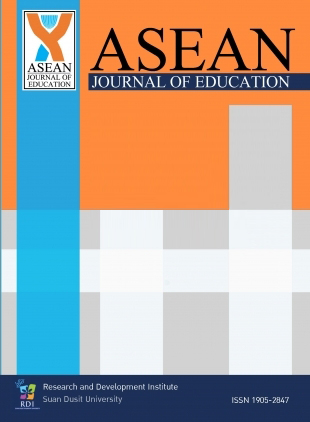A Research Synthesis on Learning Management that Develops 21st Century Learning Skills by Meta-Analysis
Keywords:
Learning management, 21st century, Meta-analysisAbstract
The purpose of this research were 1) to study the effect size of research studies on learning management that develops 21st century learning skills, 2) to study the characteristics of research studies influencing effect size of learning management that develops 21st century learning skills, publicized during 2008-2017, a total of 86 issues. The research instruments were quality evaluative forms and research characteristics coding forms. The data were analyzed by descriptive statistics, analysis of difference of means using forest plot and subgroup analysis.
The result of research synthesis were:
1. The research characteristics found that most research studies on learning management that develops 21st century learning skills were conducted by Chulalongkorn University (88.4 %) which was published in 2016 (17.4%). Most research studies were critical thinking skills and problem-solving skills (33.7%). Most innovation used teaching methods (91.9%). Most objectives were for research and development (61.1%). The instructional media were two-way instructional media (93.0%) and measurement and evaluation methods were testing (100%). The type of research hypothesis were mostly directional hypothesis (52.8%). The sample acquisition method was simple random sampling (100%). The research instrument was a test (100%). Most research studies collected data for 1-2 months (83.77%). Most statistic for data analysis was t-test (72.2%). The total quality of research reports was excellent (M = 4.50, SD = 0.65).
2. The key findings were as follows: 1) The total effect size of learning management that develops 21st century learning skills was 1.09. 2) The effect size of learning management that develops 21st century learning skills in each research had high heterogeneity with statistical significance at the .05 level (Q (85) = 648.51, p < .0001) 3) The characteristic of research influencing the effect size of learning management that develops 21st century learning skills was instruction.
References
Cohen, J. (1988). Statistical Power Analysis for the Behavioral Sciences (2nd ed.). Routledge. https://doi.org/10.4324/9780203771587
Higgins, J.P. and Green, S. (2008), Cochrane Handbook for Systematic Reviews of Interventions, Version 5.0.0, The Cochrane Collaboration and John Wiley & Sons, England.
Komtongsuk, T. (2007). A research synthesis in integrated instruction: META – Analysis and content analysis. Thesis for degree of master of Education, Chulalongkorn University.
R Core Team. (2019). R: a Language and environment for statistical computing. (Version 3.6) [Computer software]. Retrieved from https://cran.r-project.org
Sahin, M. C. (2009). Instructional design principles for 21st century learning skills. Procedia-Social and Behavioral Sciences, 1(1), 1464-1468. St. George’s College. (2013). Educating for the 21st century. Retrieved from http://www.stgeorgescollege.edu.pe/pg-en/educating-for-the-21st-century.php
Sukamolson Suphat. (1989). A meta-analysis and synthesis of research related to English language teaching during 1972-1987. Bangkok: Chulalongkorn University Language Institute.
Udomkun Narue. (2009). A meta-analysis of research in learning process management innovations for the development of learning achievement in social studies of secondary school students. Chulalongkorn university: Bangkok. DOI : https://doi.nrct.go.th/ListDoi/listDetail?Resolve_DOI=10.14457/CU.the.2009.714
Downloads
Published
How to Cite
Issue
Section
License

This work is licensed under a Creative Commons Attribution-NonCommercial-NoDerivatives 4.0 International License.
1 All articles will undergo a formal peer-review. A panel of experts from within or without the university will examine the article; approval from a minimum of two experts is required for publication. Revisions posed by the experts must be completed by the research prior to publication.
2 Once published in the ASEAN Journal of Education, the article becomes intellectual property of Suan Dusit University. Duplication, in full or part, requires permission from Suan Dusit University.
3 Excluding errors incurred during printing, author(s) are responsible for the content of their articles.






